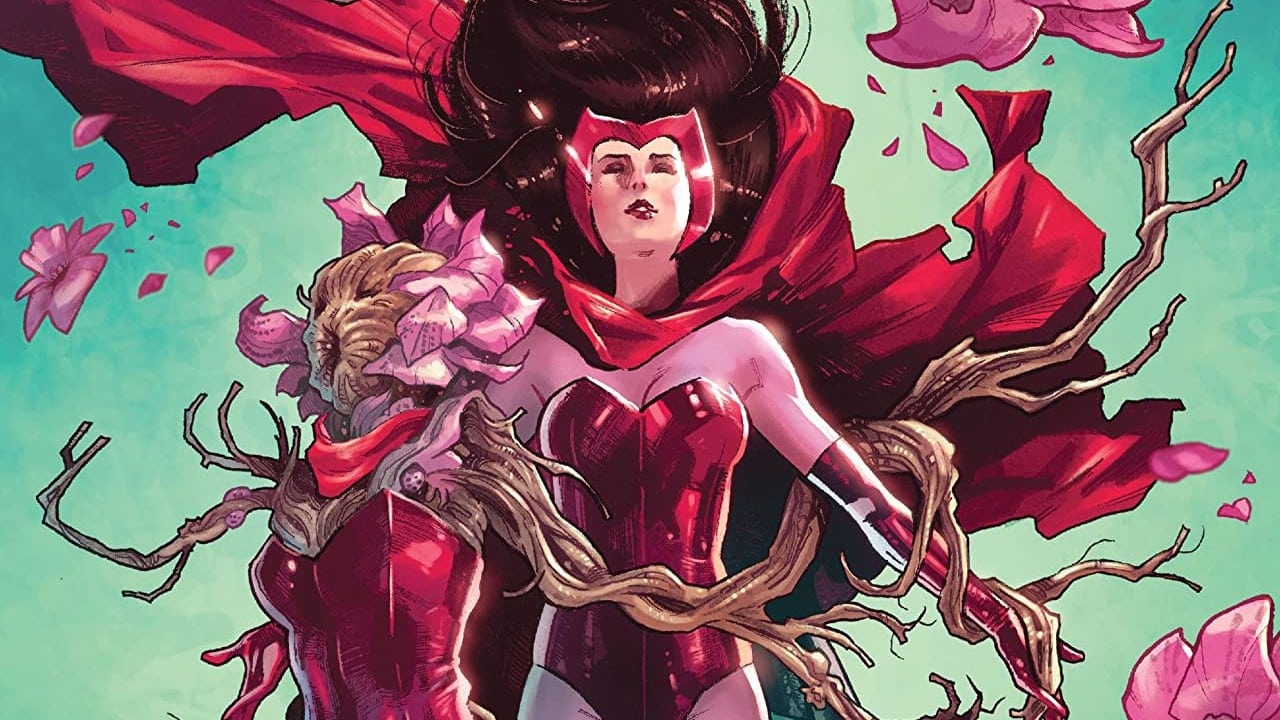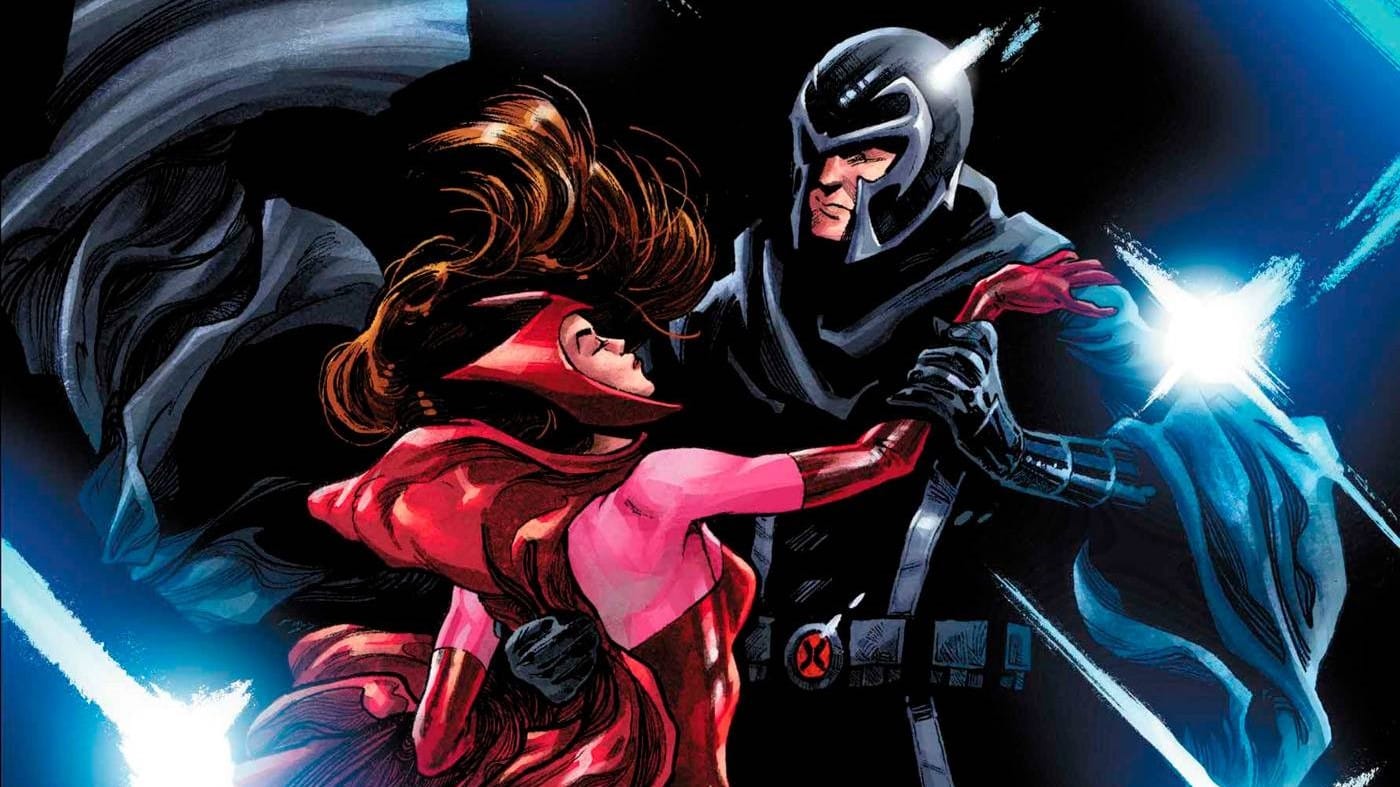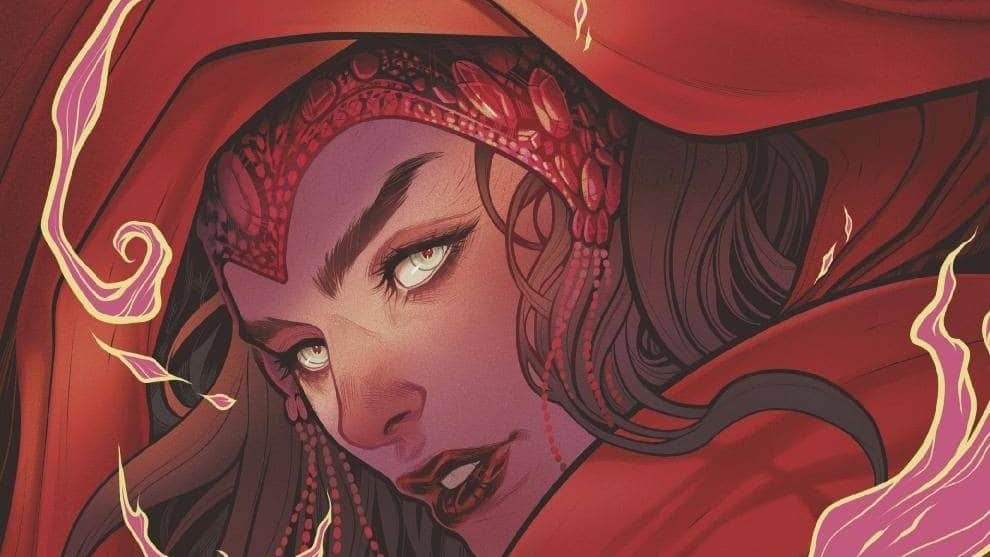Alas, nothing is ever what it seems on Krakoa. As we continue to unravel the mystery of Wanda, she faces her toughest challenge yet, herself. Let’s join Leah Williams, Lucas Werneck, David Messina, Edgar Delgado and Clayton Cowles as we spin the wheel once more in X-Men: The Trial Of Magneto #4.
Charlie Davis: Well Andrea, we’ve got a bit of catching up to do. It seems we’ve gotten our chunk of mystery and magic out of the way only to encounter more mystery and even more magic! I will say that I’m not surprised that we’re here considering everything Wanda has been in the past two decades. There is a lot of canon to reflect on, so how about we give it a go.
Andrea Ayres: We truly do. I am pretty sure I am still full from all the pie I ate, so I have the stamina to do this work Charlie. I am glad to be writing with you again as I know we’ll both have a lot to say about the events of Trial of Magneto #4. Before we go on, might I just say that I’m still upset over the slapdash insertion of a kaiju from Trial #3? Okay, there. I said it.
Hate Me Today, Hate Me Tomorrow

Andrea: If there is one thing you can guarantee will never die, it’s the depth of Wanda’s self-hatred. Trial #4 begins with Wanda continuing to piece together who she is and her past. Wanda says, “Some mornings, my body wakes up before my mind does. For a single, incandescent moment, I am nothing but awake and alive.”
If there’s one thing Leah Williams writes well, it’s trauma narratives. I am not being flippant here. I mean this as a compliment. The intricacies and nuances of trauma are many and let’s face it, Wanda has been done dirty by many writers in that department.
As a character, writers have been either reluctant, incapable (or perhaps both) of diving into how trauma manifests. From what I’ve read of Leah’s work, it is often conveyed in a single line. In this comic, it comes from the sentence I described earlier. If you’ve experienced trauma, there’s that moment early in the grieving process or trauma processing where you forget. For many, it happens when they first wake up. It’s not for long, but in those few, brief moments, the chest-tightening pain and horror of sadness or emotions haven’t settled. Instead of giving us a cliche “maybe it was all a dream…” Williams describes the luminosity of hope that comes from a brief and beautiful respite of ignorance.
Charlie: It’s really incredible, honestly. For anyone familiar with William’s work, she uses trauma in ways that nearly no one in comics has explored in quite the same way. It’s always used to propel the characters forward, nor mire them in their own misery. Wanda is a character that has been stuck for a really long time in the tangled continuity web that is a shared superhero universe. Who knew what breaking her out of the cycle would be the thing to actually shatter everything. And I mean that in a good way.
One thing I did want to touch on before getting into everything happening in this issue, is what transpired in issue # 3. We didn’t get to touch on it due to a bit of outside interference, but I thought the themes brought up in that issue regarding consent of being resurrected, what it means when your trauma is removed, and then having it foisted back on you were some incredibly engaging comics. I almost wish that William’s would have been able to push further with that, as those themes have been begging to be explored on Krakoa for quite some time. Who are you when your trauma isn’t defining you? And most importantly for the X-Men. Who is Wanda when you can’t point fingers at her anymore?
All of those questions lead to issue #4 and an attempt to weave all of those threads in with Wanda’s continuity. How do you think they managed to square the circle here?
Andrea: I am so glad you brought that up, Charlie. When Rachel sees that Wanda’s backup is limited and plays her “greatest hits,” it is thought-provoking. Though I don’t believe Rachel is guided by mal-intent, are we defined only by who others see us? Is the total of who we are dependent on how others remember us, our greatest hits?
Though I don’t love the appearance of the kaiju in issues #3 and #4, I will nonetheless respond to them. Wanda’s powers, however destructive they have been or might be, coincide with her trauma. Issue #3 is no different, and the kaiju appear as Rachel and Jean restore some of her memories. If we are not ready to process our trauma, the outcomes can be poor, and we can be more likely to be retraumatized, relapse, or revert to maladaptive behaviors. The tension for Wanda and many X-Men who hate her is that they need Wanda to capitulate. They need and want Wanda to deal with her trauma, but not in a way that is right for her, in a way that allows them the opportunity to process their own.
The thing with trauma that Williams understands so well is that unaddressed trauma in families and communities creates a cycle. That cycle has inertia, and when you are in that cycle, it’s hard to know you are a part of a system that replicates trauma or trauma-informed responses and behaviors. That’s why I wish the kaiju scene didn’t take up as much of issue #3 as it did. I’m okay with using these monsters as stand-ins for the objects of our mind that we conjure up when we are not ready to face ourselves, our past, or even our anxiety over the future. Still, we don’t get an opportunity to dive into that because you know, “superhero comics need fights to be superhero comics or otherwise editors people will get angry.”
I think answering your question brings us to a new topic. Sure this isn’t the best segue I’ve ever had, but deal with it okay!
Love Hurts

Andrea: So, did the team square the circle with Wanda’s story? I mean, that feels like a task that would require much more than a few pages in a single issue. Of course, that’s me, operating in a dream space where comics creators get as much time and space as they want. That’s not the world Williams, Werneck, or Messina get to operate. For that, I believe the team handled it as best they could. They did so by having Wanda battling herself for a few pages. That ticked all the boxes because I am in a constant battle with my past, present, and future self. Seeing Wanda engaging in an actual fight with herself, well, that’s just good comics. What did you think about it?
Charlie: One thing I have been really happy with is that Billy and Tommy have been here for this chapter of Wanda’s story, they are extremely important part of Wanda’s history and her canon and while I loved the beginning two issues and how they handled this, I’m not sure I can say the same for this issue’s appearance. Their confrontation of Wanda and pushing her to tell the truth about her involvement with the kaiju coupled with Wanda struggling in the magic void space didn’t quite work for me. It didn’t feel so cathartic as it did pushing buttons until something snapped.
Andrea: The section feels odd. The pacing and narrative are missing something. It’s not that I can’t imagine Billy and Tommy not being upset. It’s the intensity of their anger and how easily it is dispatched. Werneck did such a great job displaying the pain and frustration on their faces. It is a pain mixed with complete sadness, and because we have this intense emotional response to Wanda and the monsters she created, I wanted there to be something else? Like Wanda’s self-actualization happens too quickly. Billy and Tommy barely have time to say why she needs to ‘take accountability for her actions before she is essentially like, “oh okay then, well if that’s what I need to do.”
It feels rushed. Are we expected to believe that fifty years of the canon will be resolved that quickly? Alas.
Charlie: You’re 100% right. It’s too much and it happens too fast and it’s really easy to tell that these things have been shuffled around by the entity that is Marvel. Hell, if I’m being really, really honest here, the entire existence of the kaiju, the fact that the X-Men and the Avengers are standing around to scrap or fight at the drop of a hat? It’s classic comics, but this book didn’t need it. It had enough to do as it is. If that space could have been used to elaborate on the more important emotional beats in the comic, this would have felt more complete in so many ways. This issue is a tale of two comics for me and I vastly enjoy one of those comics over the other. I bet you can guess which.
Andrea: If I could lift your response to the editors at Marvel, I would do. Please, let the characters emote and express themselves. Let those feelings be resonant and purposeful. Marvel comics often suffer from the fate of becoming too self-conscious when they are emotionally charged. You can always tell because they pull a, “BUT DON’T GO YET, WE STILL HAVE A BIG ACTION SCENE! SEE! WE’RE STILL A SUPERHERO COMIC!” Meanwhile, I’m over here thinking, “what the ballsack is this crudely inserted action sequence that serves no purpose aside from trying to capitulate to an imagined audience certain Marvel editors believe read only for the action. When, in reality, Marvel would be better served by giving readers sincere and nuanced characters.
How did you feel about how Wanda reunited with her various selves?
Charlie: I’m glad you asked because…I think viewing these three distinct parts is just what we all needed to see to move forward.
This is Healing

Charlie: I could lie to you and say that everything that’s gone on on Krakoa has tickled my fancy, but there have been some gaps in some of the stories that my brain just hasn’t jived with. The demonization of Wanda was absolutely one of those things, but something I believed was going to be paid off. We do get some of a pay off here, but a small part of me wished that maybe we could have stuck with the theme of “are you really the same person if your memories are not the same” that we were skirting around the edges of with the entire existence of resurrection on Krakoa. Wanda has been put through the meat grinder so much in regards to canon, I wanted something to hang out hats on in regards to how the characters in the books have treated her as well. Healing. It would have been healing.
Andrea: Yes. Although Williams’ writing does a lot of heavy lifting here, it’s too much for a single issue. It also ends up undermining the good Williams is doing with her writing about trauma. The work of resolving your pain, healing yourself, and learning to love yourself, lasts a lifetime. There are some allusions to this work when Wanda entangles with Old Wanda. That self-work is interrupted by the need to address the monsters. It also dilutes those incredible splash pages by Werneck. We have these gorgeous images of Wanda reuniting and healing herself, but there’s no time to savor them. That art is distinctively feminine and that it is bulldozed by a return to the monsters really chaps my ass. I don’t know who I need to speak to at Marvel but seriously, your readers are smarter than you give them credit for, even (and especially) children. Why do I say this?
The monsters stand in for Wanda doing the reparative work of righting past wrongs and harms. The kaiju are created as a manifestation of her trauma and everything Wanda cannot or will not face. The monsters risk tearing apart her friends, family, and every remnant of what she holds personally and professionally dear. When Billy and Tommy yell at her, she almost instantly accepts her need to take accountability. At that moment, Wanda says she is reminded of her brother. Which was a real head-slapper for me. God forbid Wanda be allowed to experience growth as a character for any other reason than it being tied to a response to the men in her life (her sons, father, brother, and so on). I want a Wanda that can have self-actualization that isn’t hinged on the masculine or its derivative. I dunno, where do we go from here, do you think?
Charlie: I would have really liked to think that this would be a launching pad for Wanda to come back to herself and launch into a solo series or a headlining series that worked to actually redefine her after all of these revelations, but now I’m not so sure. I know we have one more issue and one main mystery to unravel, but I find that there was so much continuity to push through that 5 issues of a miniseries was never really going to be enough. This kind of work deserved room to breathe. Leah Williams deserved a platform to tell this story and not have it scrunched into an event mini. Wanda deserves to be redefined in a way that actually sticks and the world of Krakoa deserves some more radical storytelling playing with the elements that were so expertly hung to be used for later. All of this seems…too safe.
Final Thoughts

- As always we want to note that Williams is a friend of members of our editorial staff, but we cover her just like anyone else.
- I could give a rat’s tail about the Avengers in this. GO AWAY. I don’t care.
- Don’t love the “it’s always her fault line” but I reckon we aren’t supposed to. I should stop expecting Marvel comics to write compelling women characters. I’d save myself the grinding jaw pain.
- Krakoan: THE ACCUSED






